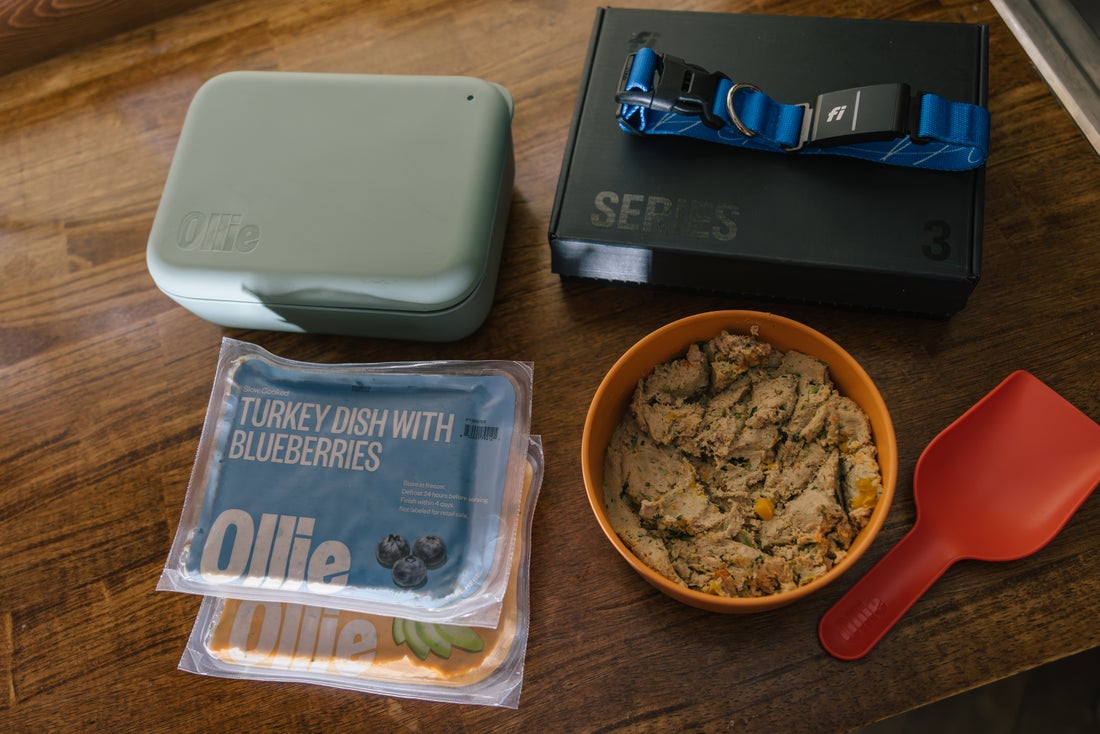Hey Ollie blog readers! We’re offering you an exclusive 60% OFF your starter box! Try now!
According to the Arthritis Foundation, arthritis affects one in five dogs.1 This progressive disease can cause significant pain and can limit your dog’s mobility. The condition is most common in senior dogs, but pups can be affected at any age, especially if they have a joint issue that predisposes them to arthritis. Osteoarthritis (OA) is the most common type of arthritis diagnosed in dogs. This inflammatory condition causes an affected dog’s cartilage to degenerate, resulting in friction between the joint bones. As a concerned and conscientious dog parent, you want to prevent your furry family member from suffering joint pain. Keep reading to learn if your pup is predisposed to arthritis, and how to help manage this condition and to keep your dog’s joints healthy.
Is my dog at risk for arthritis?
All dogs are susceptible to arthritis. However, certain factors can predispose your dog to the condition, such as:
- Breed — Certain breeds, such as miniature poodles, German shepherd dogs, Labrador retrievers, Great Danes, and golden retrievers, are predisposed to joint developmental issues, giving them a greater arthritis risk than other dog breeds.
- Weight — Overweight and obese dogs have a higher arthritis risk than those who maintain a healthy weight. Excess weight strains dogs’ joints, and fat cells create a chronic, low-grade inflammation throughout their body, intensifying the condition.
- Nutritional history — Dogs fed inappropriately for their breed and life stage have a higher joint issue risk that can lead to arthritis.
- Abnormal joint development — Dogs affected by conditions such as hip and elbow dysplasia, luxating patellas, and osteochondritis dissecans (OCD) are predisposed to arthritis.
- Injury — Dogs who have suffered a joint, ligament, tendon, or bony injury have an increased arthritis risk.
How do I know if my dog has arthritis?
Your pup is extremely good at telling you when they are hungry, when they need to go for a walk, and when they want to play, but they aren’t so adept at telling you when they have joint pain. Arthritis signs can be subtle, making detection difficult. You may believe your dog will limp if they have joint pain, but this isn’t always the case. Keep an eye out for these arthritis signs:
- Reduced mobility — Joint pain can cause your dog to have mobility issues. If your dog is experiencing arthritis pain, they may demonstrate these signs:
- Reluctance or refusal to jump on or off surfaces
- Difficulty navigating stairs
- Moving stiffly, especially after resting
- Difficulty rising from a resting position
- Reduced activity — Joint issues can cause your dog to be less active. If your dog is experiencing arthritis pain, them may demonstrate these signs:
- A slower pace when on outings
- Increased time spent resting or sleeping
- Reduced interest in interacting with people and other dogs
- Temperament changes — Joint pain can cause your dog to exhibit behavioral changes. If your dog is experiencing arthritis pain, they may demonstrate these signs:
- Irritability around people and other dogs
- Uncharacteristic aggression
- Irritability when handled
What can I give my dog for joint pain?
Numerous nonsteroidal anti-inflammatory drugs (NSAIDs) and pain-relieving medications are available to help relieve dogs’ joint pain. Your veterinarian may also recommend beneficial joint supplements such as2:
- Glucosamine — Glucosamine is a cartilage matrix building block, which stimulates cartilage cell growth. This supplement also provides anti-inflammatory effects, and studies have demonstrated that the results were similar to drug therapy.
- Chondroitin — Chondroitin inhibits cartilage-destroying enzymes and may inhibit joint-targeting inflammatory mediators. This supplement is commonly used in conjunction with glucosamine.
- Turmeric — Turmeric inhibits the proliferation of certain inflammatory mediators to decrease joint inflammation and is especially helpful when used in conjunction with other treatment modalities.
- Omega-3 fatty acids — Omega-3 fatty acids support joint health and have significant anti-inflammatory effects. Ollie’s fresh, human-grade dog food recipes contain salmon oil, an excellent omega-3 fatty acid source. If your pup is eating a well-supplemented dog food, you should talk to your veterinarian before further supplementation.
Ollie’s Zoomies hip and joint supplement contains glucosamine, chondroitin, and turmeric to support your pup’s joint health and help add some pep to their step.
At what age should I start my dog on a joint supplement?
Joint protective supplements should be started as early as possible in dogs predisposed to arthritis. You can safely give joint supplements to puppies as young as 8 weeks of age. Talk to your veterinarian to determine whether your dog is a good candidate for joint supplements, and they will recommend the best product for your furry companion.
What else can I do to help my dog with arthritis?
Arthritis treatment is typically more effective when managed in a multi-pronged manner. In addition to medications and supplements, other treatment strategies include:
- Weight management — Maintaining a lean body conformation is crucial to manage a dog’s arthritis effectively. If your dog is overweight, consult your veterinarian to devise a safe weight-loss program.
- Physical therapy — Regular, controlled exercise is important for arthritis management. Passive stretching, range-of-motion exercises, controlled obstacle navigation, swimming, and underwater treadmill walking can decrease an arthritic dog’s pain and improve mobility. These exercises can also help overweight dogs lose weight.
How can I help my arthritic dog at home?
If your dog has arthritis, modifications to your home environment can help improve their quality of life. Tips include:
- Making sleeping surfaces as comfortable as possible by providing an orthopedic or memory foam bed
- Raising your dog’s water and food bowls to prevent them from crouching uncomfortably to access meals
- Providing ramps to help your dog access elevated surfaces and vehicles
- Placing nonskid rugs on slick floors to prevent your dog from slipping
- Keeping your dog’s nails trimmed short to reduce strain on their joints and increase traction
Feeding your dog a healthy diet is critical to help keep their joints healthy and pain-free. Ollie’s fresh recipes provide excellent nutrition, including omega-3 fatty acids to promote joint health. The Ollie blog is devoted to helping pet parents lead a healthier life with their pups. If you want to learn more about our fresh, human-grade food, check out MyOllie.com.
Sources:
1.https://www.akc.org/expert-advice/health/dealing-with-canine-arthritis/.
2.https://www.dvm360.com/view/joint-supplements-dogs-helpful-vs-hype.
Tagged As:

The nutrition your dog needs,
the food they want.

Enjoying our articles? Subscribe our Newsletters and get new articles directly to your inbox
You might also like
18 September 2025
5 MINS READ
Can I Rotate Fresh Dog Food Flavors?
Yes, it’s safe to rotate fresh dog food flavors, and many dogs actually benefit from the variety. At Ollie, we offer multiple fresh recipes, like Beef, Chicken, Turkey, Lamb, and Pork so you can…
by Ollie Pets
18 September 2025
5 MINS READ
Is Fresh Dog Food Safe During Power Outages?
Fresh dog food is only safe during a power outage if it has stayed cold, specifically, below 40°F. Once the temperature rises above that point, bacteria can start to grow, and the food may no lon…
by Ollie Pets
18 September 2025
5 MINS READ
How Do I Store Fresh Dog Food While Traveling?
If you’re bringing fresh dog food on the road, keeping it cold is key. The best way to store it is in a cooler with ice packs or a travel freezer. At Ollie, our vacuum-sealed fresh food stays good…
by Ollie Pets







